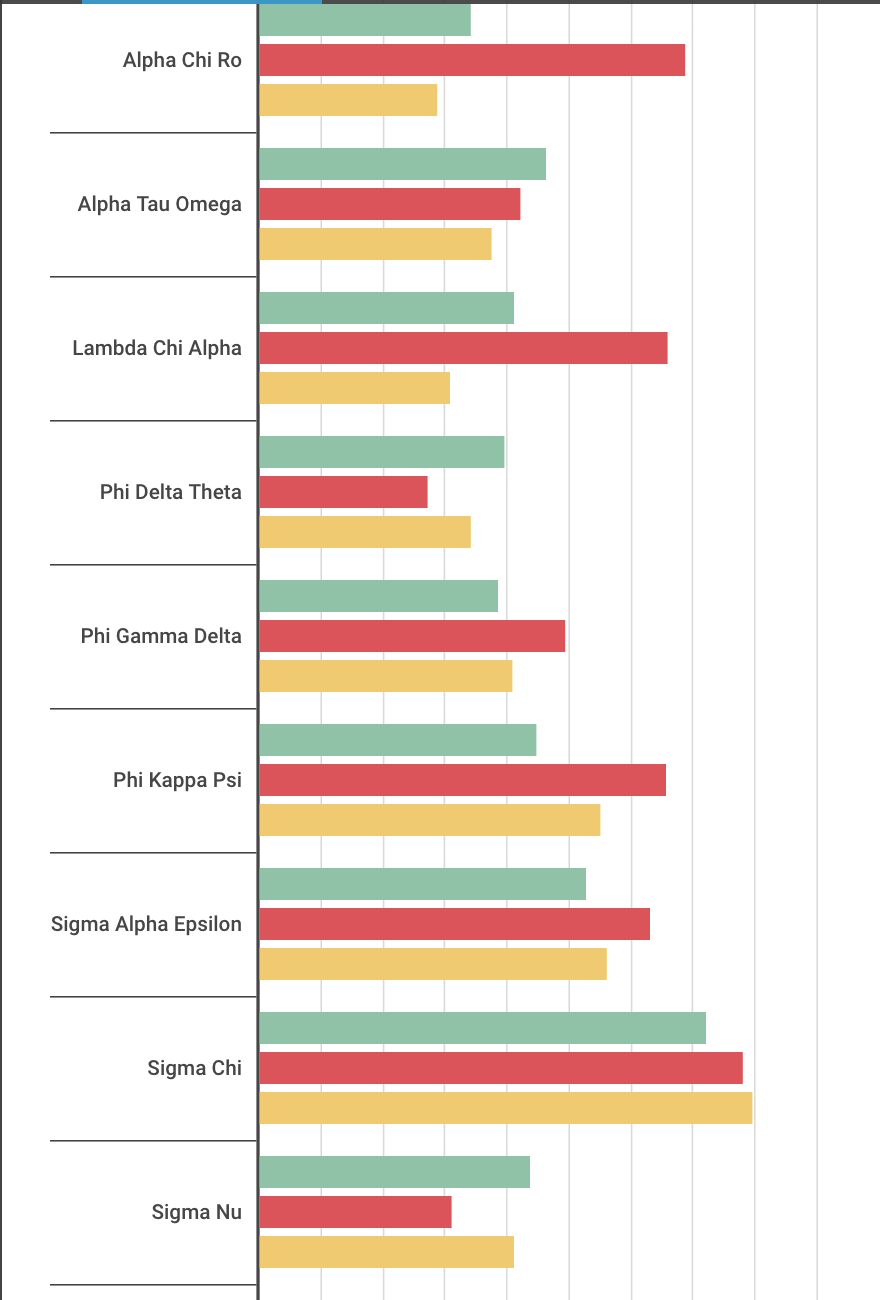Satisfactory Fraternities, Above Average Sororities: Greek Evaluation Reports Released
By Kaley Michael, Staff Writer
All but one fraternity – Sigma Chi – received a “satisfactory” rating per the 2018 Chapter Evaluations, whereas the Office of Student Activities and Greek Life (OSAGL) deemed all sororities except Gamma Phi Beta “above average.”
Unlike last year, when Sigma Sigma Sigma obtained a “Gettysburg Great” rating, this year’s chapters did not reach that benchmark. Albeit point values are increasing, ranks for the chapters are not.
Evaluation reports for each chapter of Greek life varied, but a large reason for the slow progression was the lack of documentation. Chapters received few points for categories because they failed to turn in the necessary paperwork by the deadline.
Each year, every Greek organization receives a rating of Gettysburg Great, Above Average, Satisfactory, Underachieving, or Unacceptable. Two consecutive years of receiving an Underachieving score or one year receiving Unacceptable can result in an organization’s dismissal. This year, Sigma Chi received Above Average, and the remainder of the fraternities received Satisfactory. Gamma Phi Beta received Satisfactory while the remainder of sororities received Above Average.
According to Jonathan Allen, Director of Student Activities and Greek Life, the main reason for the missing documentation was that students were “incredibly busy.” Therefore, they were unable to submit progress they might have potentially made, and suffered point deductions from the five hundred point quota they were challenged to attain.
Greek organizations’ drop-in point values as a result of this problem are “not indicative of a downward trend.” Allen defended the chapters, stating that they see the evaluation as a “guiding tool but [their] vision can be better.”
Sororities did not have the responsibility of building an infrastructure prior to evaluations due to panhellenic pre-established education expectations. Fraternities were not as lucky, which accounts for their lower scores.
Allen contends that although OSAGL sends out deadline emails and walks through paperwork with Chapter Presidents “piece by piece,” attendance sheets, risk management event reports, and service hours go undocumented.
The former IFC staff liaison, Allen works closely with the chapters on campus to provide strategic planning, goal-setting, and collaborative models. Alumni advisors, organizational headquarters, and the other office employees at Gettysburg work to improve Greek life on campus via workshops with emerging leaders and other hands-on approaches.
Fraternities and sororities at Gettysburg College have been evaluated since 1998. After Dean of Students Julie Ramsey implemented a new committee in 2013, one that would establish a rubric with multiple categories, Greek life on campus began to strive to meet many standards.
Among the benchmarks from the 2013 committee were academic achievement, intellectual engagement, community engagement, member recruitment and retention, and organizational management. The college used this standard for four years until a recent committee was formed to make adjustments to the evaluation process.
Starting in January of this year, an updated manner of evaluation was put into effect to measure Greek life while simultaneously helping chapters showcase their value to the college. The evaluation committee expects that students are adapting and contributing to the Gettysburg College community; the campus climate should be regularly bettered by Greek life.
Allen recalls when Greek life demonstrated improvements to overall campus wellbeing a year ago when chapter presidents came forward and requested more sober monitor training. Subsequently, OSAGL, in conjunction with students, developed a wristband system and orange armbands that adorn members at fraternity parties.
GPA Reports showed that Phi Kappa Psi was the frontrunner of the fraternities in both the spring and fall. Having reinstated their chapter only two years ago, their victory over similarly-performing fraternities like Sigma Chi and Lambda Chi Alpha is a great achievement.
Sororities continued their record of achieving higher grade point averages than the fraternities at Gettysburg, with Alpha Delta Pi securing first place with a 3.62 term average in the fall.
According to Allen, the GPA improvements can be attributed to bettered academic plans, alongside the involvement of academic advising. Scholarship chairs also aided in improving academic support among the fraternities and sororities.
Sororities acquired one violation of conduct the spring of 2018, while fraternities scored misconduct in every category except “Providing Alcohol to an Underage Individual.” This was a slight improvement for the Panhellenic groups, who experienced two incidents in the spring of 2017, and a one point addition for IFC.
Greek organizations’ low amount of misconducts are indicative of the 80% drop off in violations since 2015. Allen notices that chapter leadership today is much stronger than it was four years ago, as evaluations are showing members the college’s expectations. Better connections have been established, especially through the support of alumni advisors who are aligning the actions of Greek life with the goals of the institution.
Alpha Chi Rho, Alpha Tau Omega, and Phi Kappa Phi decreased their scores by nearly two hundred points since 2017, which alarmed the board and made them question if those chapters were continuously making an effort to improve.
Alpha Chi Rho presented despite missing important information such as goals and achievements. They also suffered the loss of an academic advisor, which Allen noted was a very important part of the evaluation process.
Students receive more points based on how well-established the relationship is between chapter faculty advisors and the chapter itself. Some faculty advisors meet with their designated chapter once a semester, while others are so involved that they are alumni initiated. If a chapter shows that they are actively seeking an advisor – through emails, phone calls, etc. – then the point value is taken out of the evaluation.
Evaluations are also dependent on oral presentations that are given in front of the evaluation committee. Phi Delta Theta’s larger group behooved them, which was commended by the committee. Other fraternities did not experience the same positive feedback. Phi Gamma Delta disappointed the board with its chaotic presentation and lack of preparation, while Gamma Phi Beta was chastised for a presentation without visuals. Lambda Chi was commended for its superb presentation, being noted as “well-organized” and “easy for panelists to follow what the presenters were saying.”
Citizenship and Social Justice programs have improved primarily through sororities, who naturally gravitate toward conversations surrounding sexuality and gender. Allen admitted that “sometimes chapters do not recognize that they can be involved in [citizenship and social justice] conversations.” He does not believe fraternities are avoiding the topic of equity, as Sigma Chi was the first to implement an inclusion chair. He also claims that round table discussions are helping to bring light specifically to the topic of religion.
In terms of the future of Greek life at Gettysburg College, Allen and his associates are still finalizing their strategic plan for the next five years. Review by the Board of Trustees began in the fall of 2015, which Allen claims continues to be a “good opportunity to take a step back.”
Allen notes that some important items in question for the plan regard Greek life’s work at engaging alumni, focusing on student safety, and pushing the community to improve diversity and equality. The public version of the plan will come out to the Board of Trustees in May.




March 28, 2019
My understanding is that the College now provides housing for students with similar inclination to live together–English and LBGTQ, to be specific. Do these housing units get rated also?